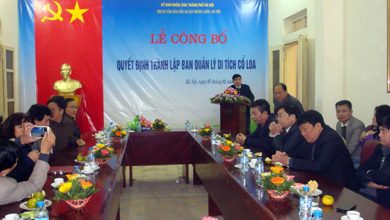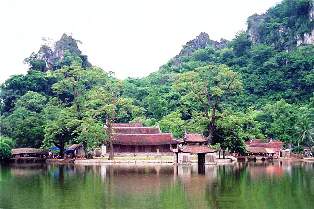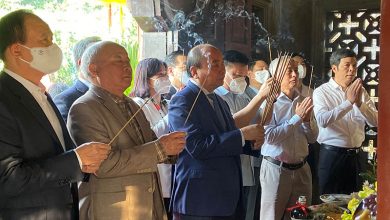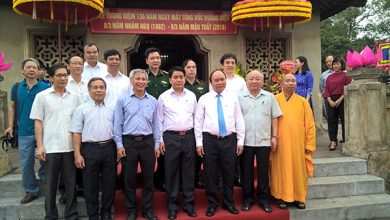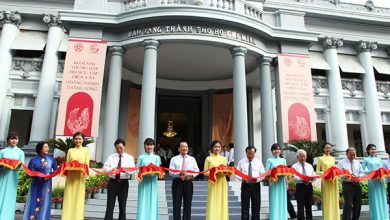Scientific Conference ”Ngô Quyền – The Ancestral King of Country’s Revival”
To celebrate the 1010th anniversary of Thăng Long – Hà Nội, on the morning of 1 October, 2020, at the Thăng Long Imperial Citadel Heritage Site, the Hà Nội People’s Committee worked with the Vietnam Association of Historical Science held a scientific conference titled ”Ngô Quyền – The Ancestral King of Country’s Revival”
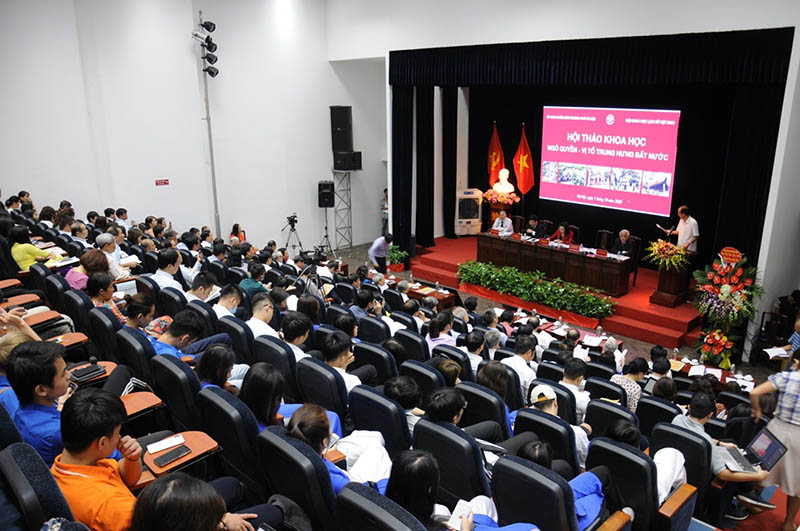
An overview of the Conference.
In attendance at the workshop were Member of the Party Central Committee, Standing Deputy Secretary of the Hà Nội Party Committee Ngô Thị Thanh Hằng, Member of the Standing Committee of the Hà Nội Party Committee, Head of Hà Nội Party Committee’s Department of Propaganda and Education Nguyen Van Phong, Vice Chairman of the Hà Nội People’s Committee Ngô Văn Quý.
The conference aims to verify the ancient writings about Ngô Quyền in general and the period when he settled in Cổ Loa and declared himself King in particular. It also serves to establish scientific grounds and basis for the construction of Ngô Quyền Temple in the Cổ Loa Special National Relic Site and develop a running order for annual national festivals Ngô Quyền Coronation and Cổ Loa Settlement designation as capital city.
Speaking at the opening of the conference, Standing Deputy Secretary of the Hà Nội Party Committee Mme Ngô Thị Thanh Hằng reviewed the merits and glorious feats of Ngô Quyền which helped establish an autonomous and independent state and end more than a thousand years of Northern domination. “The Bạch Đằng victory of Ngô Quyền, which has great historical significance, is a brilliant historical milestone because it ended more than a thousand years of Northern domination and nullified the Great Han’s “assimilation” scheme. It also ushered in a new era in the nation’s history – the era which saw the development of Vietnam as an independent and self-governing feudal nation. The historic Bạch Đằng victory provided the grounds for an event of special importance in the Spring of 939, when Ngô Quyền started to build a completely independent government. He proclaimed himself King, settled in Cổ Loa – the capital of Âu Lạc state under An Dương Vương, and reigned from 939 to 944. Therefore, the conference was an opportunity to pay tribute to the heroic king, and in doing so, advancing patriotism and a sense of self-reliance, and building a rich and strong Vietnam worthy of the stalwart traditions of our forefathers.
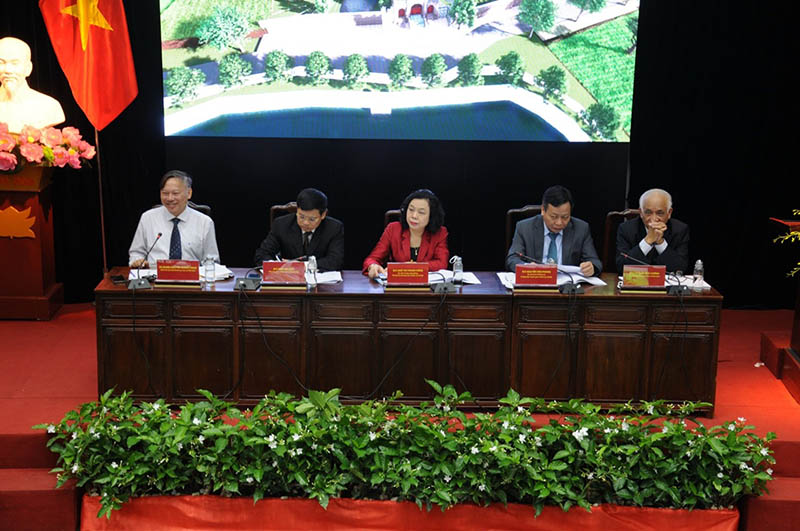
Members of the presidium
At the workshop, Vice Chairman of the City People’s Committee Ngô Văn Quý also suggested that Ngô Quyền’s formation of the country and declaration of himself king was one of the most important milestones in Vietnam’s history. While the great merits of Ngô Quyền to the country have been clearly confirmed by various historical sources, historians and related agencies still need to set the task of collecting more documents to carry out further study on Ngô Quyền. A number of seminars on Ngô Quyền’s background and career have been held recently, and many scholarly works on Ngô Quyền and Bạch Đằng victory have also been published in specialized books and journals. These sources and documents have been relatively fully synthesized by the Thăng Long-Hà Nội Heritage Conservation Centre based on the results of research on Ngô Quyền in recent years.
Vice Chairman of Hà Nội People’s Committee Ngô Văn Quý affirmed that the conference “Ngô Quyền – the King of National Revival” aims to once again affirm the sources of documents and bibliography related to Ngô Quyền in general and the period when he settled capital and proclaimed himself King in Cổ Loa in particular. It also serves to shed more light on the great contributions of Ngô Quyền in building the Ngô Dynasty in the national historical process.
The workshop focused on two main topics: Ngô Quyền and the Ngô Dynasty in Cổ Loa; Ngô Quyền’s deeds of country’s revival-Heritage and value conservation and promotion.
At the Workshop, Dr. Tran Viet Anh, Director of Thăng Long – Hà Nội Heritage Conservation Centre presented a report on the tentative plan of building Ngô Quyền Temple in Cổ Loa Citadel, including the identification of the expected location of the temple. The intended location and architectural plan must be in harmony with the surrounding landscape and monuments.
Through the 21 presentations and many analytical opinions and comments, scientists, experts, and heritage managers have shed more light on the historical context of Vietnam in the early 10th century, the family background and career of Ngô Quyền as well as the great significance of Bạch Đằng victory in 938 which ushered in a long period of national independence. The academic discussion also helped clarify Ngô Quyền’s process of proclaiming himself King, establishing the capital in Cổ Loa and his contributions to the building of a completely independent government. At the same time, it raised many issues related to the preservation and promotion of the immutable spiritual values of the King’s period, for example by constructing Ngô Quyền Temple at Cổ Loa. Such a temple is deemed necessary in terms of conservation, and as a new monument, it will also serve as the memorial established by posterity to honor the great merits of the ancestors.
The delegates also proposed that it is necessary to build a memorial monument for Ngô Quyền in Cổ Loa to honor the merits of the Ancestral King of the Country’s Revival, as a demonstration of the Vietnamese people’s moral tradition of drinking water and remembering the headspring.
As he concluded the discussion, Vice Chairman of the City People’s Committee Ngô Văn Quý emphasized that the results of the conference “Ngô Quyền – the Ancestral King of Country’s Revival” provide valuable scientific materials to affirm the position and role of Ngô Quyền and the Ngô Dynasty in the course of Vietnamese history. It also made historical and scientific contributions to enhanced understanding of Cổ Loa as an important relic site, strengthening the scientific basis for the project of building Ngô Quyền Temple to pay homage to this ancestral king of Vietnam. In addition, the discussion contributed to the development of a plan to hold an annual festival at Cổ Loa to commemorate the great merits of the national hero. “The city authorities have requested scholarly research on both of these plans, and have decided to implement them in the coming time. The construction of Ngô Quyền Temple is carried out according to the 1/2000 plan approved by the Prime Minister which is also in line with Hà Nội Party Committee and the People’s Committee’s policy. With scientific consultation, the venue has been identified to build the initial architectural model. The Standing Committee of Đông Anh District Party Committee has also sent a report to Hà Nội Party Committee and People’s Committee, saying they would like to be assigned the task of making initial preparations, investment and subsequently implementation of the project in the coming time”, said Vice Chairman of the People’s Committee Ngô Văn Quý.
Within the framework of the scientific conference “Ngô Quyền – the Ancestral King of Country’s Revival”, Thăng Long – Hà Nội Heritage Conservation Centre organized an exhibition under the same name. The exhibition was presented in the form of a panel, introducing to the public the family background and meritorious deeds of the national hero Ngô Quyền under 3 main themes: Ngô Quyền’s homeland and family; Ngô Quyền – the ancestral king of country’s revival; and Ngô Quyền’s eternity with the mountains and rivers of Vietnam. This is also an opportunity to take great pride in historical traditions of the nation and our generations of Vietnamese people’s patriotic struggle against foreign invasion.
Thăng Long – Hà Nội Heritage Conservation Centre

